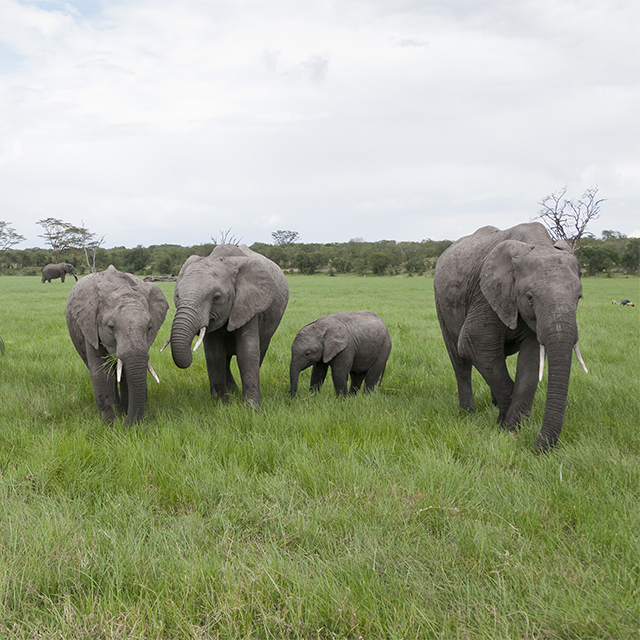
Giants Club Summit secures multi-million-dollar funding to strengthen frontline elephant protection, boost illegal wildlife trade prosecutions, and spark innovations in conservation finance
NANYUKI, April 30, 2016 – Philanthropists and financiers offered more than $5 million in immediate funding, with pledges of more to come, to launch a series of new elephant protection interventions announced by African presidents heading the inaugural Giants Club Summit.
Botswana, Kenya, Uganda, and Gabon each laid out visions for actions with proven impact, including new rapid reaction or special operations ranger units, support for strengthening prosecutions, electrified fences to keep elephants out of farmers' fields, and conservation investment strategies.
The announcements followed talks in Nanyuki, Kenya, on April 29, and immediately preceded a separate but linked event in Nairobi when the largest stockpile of seized ivory will be destroyed on April 30.
The 'toolkit' of methods the Giants Club will employ was pioneered by Space for Giants, the elephant protection charity that helped found The Giants Club, which helped drive a 79% reduction in elephant poaching in three years in the areas of northern Kenya where it operates.
Evgeny Lebedev, patron of The Giants Club and owner of the British Evening Standard newspaper and independent.co.uk, will put together a new communications strategy worth $3 million to broadcast elephant protection programmes. Ruth Powys, CEO of Elephant Family, pledged an initial $500,000 in support, and Jorge Rios of the UN Office on Drugs and Crime announced $300,000 in new funding.
The ICCF Group, an international conservation organisation, pledged $200,000 to Space for Giants to help Giants Club countries develop better prosecution protocols and procedures, to make trial processes more efficient.
Jody Allen, a leading US philanthropist who co-founded the Paul G Allen Family Foundation, committed fresh support for a special operations unit, and strengthened legal capacity, for Botswana. Kim Tan, CEO of SpringHill Management, will support new impact investments.
The Nature Conservancy, an international environmental organisation, plans an innovative green energy scheme in Kenya using the profits from solar power generation to fund the preservation of wildlife landscapes, which could drive more than $50 million in new conservation revenue.
Between them, the four Giants Club countries together hold more than half of Africa's remaining elephants, a population under protection that will be boosted after Ethiopia announced at the Summit that it would become the fifth Giants Club country.
"What we have seen at the Giants Club Summit is the start of an African conservation revolution," said Max Graham, CEO of Space for Giants. "We have always said that what is key to better protection of elephants and their landscapes, and to ending the illegal wildlife trade, is greater political will from Africa's leaders.
"At the Summit we've seen the clearest possible demonstrations of that commitment. We also remain very aware of what is still needed in terms of financial support, to allow the Giants to achieve what they have set out to do."
President Uhuru Kenyatta of Kenya, hosting the event, with President Yoweri Museveni of Uganda, President Ali Bongo Ondimba of Gabon, and senior representatives of the Government of Botswana, each announced new interventions based on the Space for Giants model.
President Barack Obama, in a message delivered by Deputy Secretary of State Heather Higginbottom, praised Kenya's "tremendous leadership in wildlife conservation". "The Summit sends a clear signal to Kenyans, to the region, and to the world, that the devastating impacts of poaching and illicit trade will not be tolerated," Deputy Secretary of State Higginbottom told the Summit.
Liu Xianfa, China's Ambassador to Kenya, read a personal letter from President Xi Jinping, describing the "great importance" the Chinese leader placed on the Summit, and promising China's support "to the best of its capacity".
Helen Clark, Administrator of UNDP, said in a keynote speech: "We can have a sense of confidence in our actions and the significant commitments being made at this summit. But let us not be complacent; let us be sure as we look back on this time that we know we acted when we could and as much as we could, before it was too late."
Details of interventions announced by each country included:
• Gabon plans to double staff at its National Parks Agency from 750 to 1,500
• Uganda intends to construct an electrified fence around Murchison Falls National Park to reduce incidents of human-elephant conflict
• Botswana will form an intelligence-led special operations unit to support wildlife rangers
• Kenya will launch a National Conservation Endowment Fund, whose profits will fund conservation
The final sessions of the two-day Summit are scheduled for the morning of Saturday, April 30, when musicians and artists join experts in community mobilisation and social media campaigning to discuss how to use celebrity influence to spread conservation messages. The Summit closes immediately before Kenya's Ivory Burn, to be held in Nairobi.